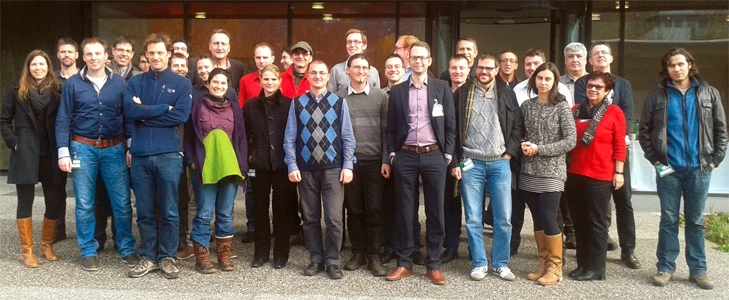HERCULES has started
European collaboration will pave the way to the next generation of c-Si based solar cell devices with efficiencies of 25 %
Sixteen leading European research institutes, universities and partners from industry have joined forces in order to collaborate closely on the development of next generation of crystalline silicon based solar cells and modules. Together they proposed a concept of “High Efficiency Rear Contact solar cells and Ultra powerful moduLES” with the acronym HERCULES and received a 7 million Euro grant from the European Commission within the 7th Research Framework Programme. The project has started the 1st of November 2013 and will finish end 2016.
HZB physicists will contribute expertise in high efficiency back-contact silicon heterojunction solar cells, novel thin film materials as well as advanced materials and device characterization.
HERCULES concept
The concept proposed by the HERCULES project is to develop innovative n-type monocrystalline silicon (c-Si) device structures based on back-contact solar cells with alternative junction formation, as well as related structures including hybrid concepts (homo-heterojunction). These concepts are the most promising silicon-based technologies to reach ultra-high efficiencies with industrially relevant processes. The HERCULES strategy is to transfer the developed processes to the industrial scale by considering all major cost drivers of the entire manufacturing process chain of modules. The concepts developed in HERCULES will demonstrate 25% efficiency at cell level, for above 340 Wp modules produced in the partners pilot-lines, and pave the way to ultra-high efficiencies for the next generation of c-Si based solar cells devices.
HERCULES objectives
The key objectives of the HERCULES project are:
- To develop ultra-high efficiency modules at the pilot scale (mean power conversion efficiency η > 21%)
- To reduce production/investment complexity and demonstrate costs down to 0.7 €/Wp at pilot scale
- To increase the durability of modules up to 35 years
- To demonstrate ultra-high efficiency solar cells: η > 25%
These technologies and their combination are evaluated throughout the whole process chain, starting from the wafer material and up to the module integration and testing stage.
HERCULES consortium
In order to meet its objectives, the HERCULES partnership gathers the leading European Research Institutes and Industries in crystalline silicon solar photovoltaic committed to reinforce the competitiveness of the EU PV industry. The HERCULES set of expertise presents synergies both on the R&D side, with a diverse set of competences and experimental techniques that are available to the consortium, as well as through the whole industrial value chain, from the silicon feedstock to the module.
The project partners are:
Research Centres:
- Commissariat à l’Energie Atomique et aux Energies Alternatives (CEA) - National Institute for Solar Energy (INES)
- Fraunhofer-Institut für Solare Energiesysteme (ISE)
- International Solar Energy Research Center Konstanz (ISC)
- CSEM SA (CSEM)
- Institut für Solarenergieforschung Hameln GmbH (ISFH)
- Helmholtz-Zentrum Berlin für Materialien und Energie GmbH (HZB)
- Centre National de la Recherche Scientifique (CNRS)
Universities:
- Institute of Microtechnology (IMT), Ecole Polytechnique Fédérale de Lausanne (EPFL)
- Universitat Politecnica de Catalunya (UPC)
Industrial Partners, companies:
- Meyer Burger AG (MEYER BURGER)
- Roth & Rau AG (R&R)
- Norsun AS (Norsun)
- Electricite de France S.A. (EDF)
- Eurotron BV (EUROTRON)
- Semilab Felvezeto Fizikai Laboratorium Reszvenytarsasag (SEMILAB)
- ALMA consulting group SAS (ALMA)
More information on HZB contributions
Dr. Lars Korte
Tel.: (030) 8062-41351
Fax: (030) 8062-41333
Email: korte(at)helmholtz-berlin.de
Project coordinator:
Delfina Muñoz
Tel.: +33 (0) 4 79 79 28 38
Email: delfina.munoz(at)cea.fr
